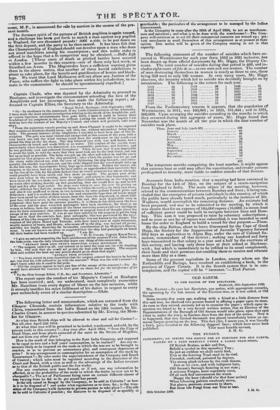Captain Chads, who was deputed by tbe Admiralty to proceed
to Boulogne, and investigate the circumstances attending the loss of the Amphitrite and her passengers, has made the following report ; ad- dressed to Captain Elliot, the Secretary to the Admiralty.
" Royal Hotel, Boulogne, 11th September 1833. " Sir—In obedience to the commands of my Lords Commissioners of the Admiralty.
I have made the most minute investigation relating to the wreck of the Amphitrite, and, as various injurious misstatements have gone forth. I deem it right to inform their Lordships of my judgment in the case, without waiting the result of the inquiry 1 am making into the conduct of his Majesty's Consul, and which will probably take some days. " From the numerous vessels passing up and down Channel it ought to be expected that occasional disasters should occur, and that, too, without misconduct being impu- table. The present instance of the Amphitrite I consider to have been one of this de- scription. The gale was most violent and unexpected at this season of the year, with a very heavy sea, and the wind veering round front the south-west to the northwest placed the ship on the lee shore. The ship behaved very well, was well found, bad a chronometer on board, and made little or no water. The conduct of the master, more particularly when danger was discovered, was seamanlike, judicious, and decisive, and Le was perfectly cool and collected throughout. When he saw that it was impossible to avoid the land, he told the mate that they must look out for the best berth, and run her up as high as possible. The helm was put up, the after sail taken in, and the yards squared for th9t purpose as the ship grounded; after which the anchor was let go. and the chain cable shoved out, with the view of lightening the ship forward; and subse- quently the shackle was taken out, and the cable slippo:d, that the vessel might drive up as the tide rose, the maiutopsails being kept up to assist her. Neither the master, the surgeon, or the crew, had any fears for their safety, or apprehended their inevitable fate on the rise of the tide, for the pilots declare that no vessel, whatever her size or strength, could possibly have been saved, and they made no signals. The greater part of the crew went below in the evening, some to supper, and others to their hammocks, and were there till the sea broke over them about nine O'clock. believing, as the ship made no water after striking heavily, on first great:ailing. that she would float up. and be left high and dry after high water. No steps were taken to save the crew by getting on shore, although they bad the means for doing so within themselves by their own boats, and also it was proffered to them, in two instances, by some gallant French pilots and fishermen; and it is evident there was a fair and reasonable hope that all bawls might have been saved by either of these means, from the time the ship struck, at about half- past four, till near seven in the evening ; for this sad, this most deplorable efror in judgment, they have paid the extreme penalty; it is through this fatal error the lives of the crew and the poor wretched passengers have been sacrificed ; for there is no reason to believe, from the evidence of the three surviving seamen (all very intelligent men for their situations), that either the master or surgeon feared or thought about the escape of the poor convicts. It was at one time ordered by the surgeon to get the long boat out to land the convicts, but, most unhappily, this was prevented by the inter- ference of his (the surgeon's)wife. This occurrence was not known to the master. The conduct of the pilots Herat and Tertaide, with their boat's crew of eight volunteers, mostly masters of boats, and Henin, who swam off to the ship, was beyond all praise, and they are highly deserving the favourable consideration of his Majesty's Govern. rnent. It was not known on shore or suspected that the ship had passengers on board Sill their bodies had been washed u "I am, &c. up. "H. D. CHADS, Captain Royal Navy.
" I give an extract respecting the fatal interference of the sure.eon'4' wife. John Owen, the boatswain, was the only witness that knew any thing of this occurrence. "EXTRACT FROM 3011N OWEN'S DEPOSITION. TAKEN SEPTEMBER 10.
The surgeon called us aft, and ordered us to hoist the boat out, his wife standing 'by him. She said that she would not go into the boat with the convicts. The surgeon then said neither the boat nor any person should go on shore that night.'
" EXTRACT FROS1 EVIDENCE.
'You have stated in your deposition that the surgeon ordered the boat to be hoisted o at, but that his wife refused to go with the convicts ? What was the wife's reason ?—I don't know what else it could be but pride. "'Did the surgeon appear to have any fear of the escape of tlte convicts?—No. He would have allowed the convicts to have gone on shore, but fur the interference of his
• •P To the Hon George Elliot, CB., &c., and Secretary, Admiralty."
The report upon the conduct of his ' Majesty's Consul at Boulogne has been received ; and, we understand, most completely exonerates Mr. Hamilton from every degree of blame on the late occasion, while it strongly testifies his strict fulfilment of his duties in respect to every past melancholy event of a similar description.—Globe.






















 Previous page
Previous page